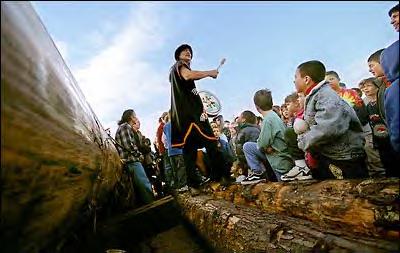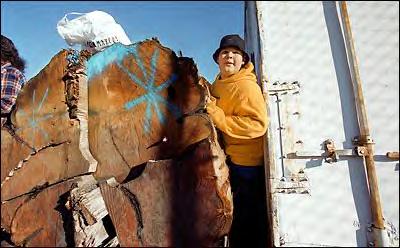|
|
Canku Ota |
|
|
(Many Paths) |
||
|
An Online Newsletter Celebrating Native America |
||
|
January 27, 2001 - Issue 28 |
||
|
|
||
|
Log to Become |
||
|
"Rite of Passage" Canoe |
||
|
by Rebekah Denn Seattle Post-Intelligencer Reporter |
||
|
Photo Credits: Paul Joseph Brown / Seattle Post-Intelligencer |
||
| Yesterday, it was still a log, albeit a majestic log -- 750 years old and 41 feet long,
smelling sweetly of its cut cedar base and a smudge of burning sage. Children from Seattle's Alternative School No. 1 crowded around the rough wooden trunk as it rested at their Northgate schoolyard yesterday. They were told that Haida carver Robert Peele would carve a canoe from the log over the next six months -- not creating the canoe, so much, as liberating the shape the log was born to become. And the adults, watching the children, knew the transformed log would help do the same for them: forming the adults they were born to be from the youngsters they still are. The students will use the completed canoe in June for the school's "Rite of Passage," an annual wilderness journey to help mark the graduation of eighth-graders and their voyage to adulthood. Starting at Diablo Lake in the North Cascades, the graduates and their school leaders plan to journey all the way to Canada. But it will be a project for everyone: Peele, whose Native American name is Saaduuts, told the assembled children that all grades in the K-8 school would help him with his task. "By removing even one piece of wood, they can say, 'I was a part of that,'" principal Ron Snyder said. |
||
|
|
Snyder said the idea for the rite of passage began 10 years ago when seventh-grader Ras
Ali told him that children needed a ceremony to mark adulthood the way other cultures did, something beyond a first
drink or a teenage pregnancy, beyond joining a gang or getting a driver's license. "(He said), 'It's the only way you know that somehow you've reached adulthood.' How are we going to change that?" Ali, now 21, returned to the school yesterday for the blessing, with vivid memories of the rite that ensued that first year -- a beach hike from Cape Alava to La Push, a 30-mile trip that felt like 60 through the sand, brush and water. |
|
| "It was really challenging for me, which is something I really appreciated . . .,"
he said. "It changed my whole life after that. I knew that I could go anywhere." The experimental school, which relies heavily on hands-on education and field trips, already had an affinity for the water: The students have built a fleet of model sailboats through the Center for Wooden Boats, and some went directly from the blessing to their own woodworking class. The canoe project will be funded through a $12,000 King County Arts in Education grant, money the carvers said won't nearly cover the costs. Melissa Koch, Peele's partner, said they'll finish the project regardless, "because it's the right thing to do." At yesterday's blessing, Peele, dressed in ceremonial clothing, talked with the students about the need to respect the Earth and its creatures; to conserve and appreciate its resources; to respect people of all kinds and to work with them together. |
||
|
|
"It's what we have to get back to as a people, to share together -- to make the canoe
together," Peele said. As he beat a decorated drum, the children came forward to throw pinches of salt to purify the log and the ground around it, pledging to work on the project only when they were in good spirits. "We'll honor this log totally and put our spirit and energy into it," Peele said. Yesterday, he only cut off a preliminary strip of bark to give to Harlan Sam, a cousin who spoke at the ceremony, in thanks for his words. Monday will be the start of the canoe -- cutting off the log ends to shape the bow and stern; later, hollowing and steaming out the trunk's center to make it large enough for eight or more paddlers. |
|
| Student Monica Martinez, 9, looked doubtful at the prospect as she eyed the tough wood. "Ron, it looks pretty hard," she told the principal. But Koch said the wood's toughness and age are an advantage for canoes, and that the tree is a prize. The log, 5 feet in diameter, was a "priceless" gift donated by Weyerhaeuser, Koch said, barged and then trucked in to the school after a lengthy search for a quality log. It was finally found, she said, in the Queen Charlotte Islands, historically Haida land, in British Columbia. Sam, speaking to the students, promised them its final form will take them on journeys of meditation and growth. "This canoe is going to be medicine for someone," he said. "It will be part of someone, some of the young ones, some of the elders." |
||
|
Spirit of Peace |
||
|
Center for Wooden Boats |
||
|
|
||
|
|
||
| Canku Ota is a free Newsletter celebrating Native America, its traditions and accomplishments . We do not provide subscriber or visitor names to anyone. Some articles presented in Canku Ota may contain copyright material. We have received appropriate permissions for republishing any articles. Material appearing here is distributed without profit or monetary gain to those who have expressed an interest. This is in accordance with Title 17 U.S.C. section 107. | ||
|
Canku Ota is a copyright © 2000, 2001 of Vicki Lockard and Paul Barry. |
||
|
|
The "Canku Ota - A Newsletter Celebrating Native America" web site and its design is the |
|
|
Copyright © 1999, 2000, 2001 of Paul C. Barry. |
||
|
All Rights Reserved. |


